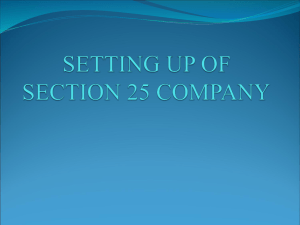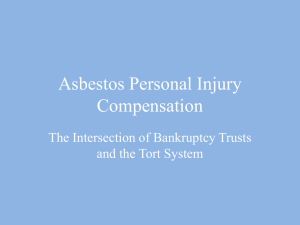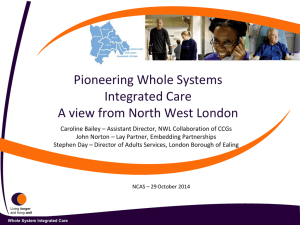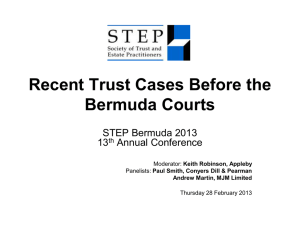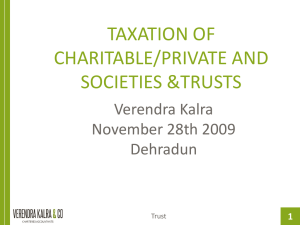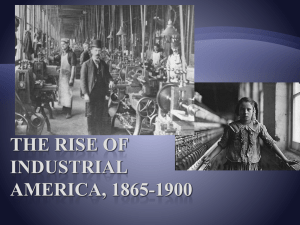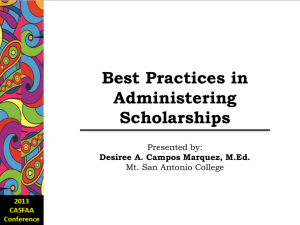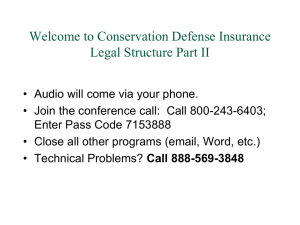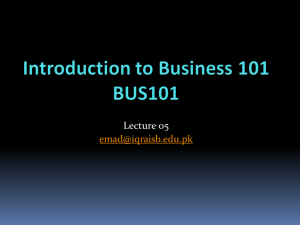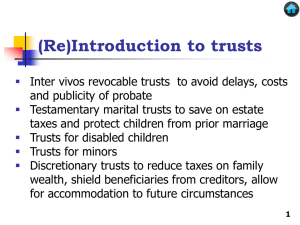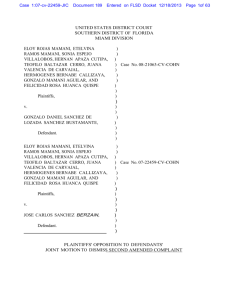The Challenge of Mass Personal Injury Litigation
advertisement
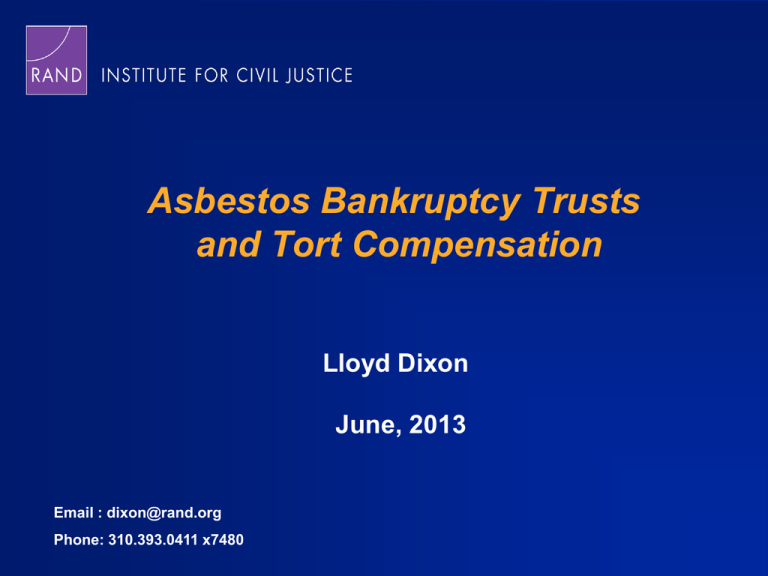
Asbestos Bankruptcy Trusts and Tort Compensation Lloyd Dixon June, 2013 Email : dixon@rand.org Phone: 310.393.0411 x7480 There Is a Great Deal of Controversy About the Interactions Between the Trusts and the Tort System Are plaintiffs able to recover once in the tort system and again from trusts? Is the liability of the remaining solvent defendants adjusted to take account of trust payments? Is the information used to recover from the trusts available in the tort case? Plaintiffs Can Recover from Trusts and Through the Tort Process Plaintiff Tort claims Settlements D verdict Trust claims Trial P verdict Claim evaluation Payment No payment Verdict molding Payment RAND 3 The Are Multiple Linkages Between the Two Systems Plaintiff Tort claims Trust claims Information linkage Settlements D verdict Setoff linkage Trial P verdict Verdict molding Claim evaluation Payment No payment Trust payment limitation linkage Payment Indirect claim linkage RAND 4 We Investigated these Linkages in Six States States with joint and several liability Illinois Pennsylvania West Virginia States with some form of several liability California New York Texas Findings on Linkages Information linkage All six states require disclosure of trust claims that have been filed But trust claims are frequently not required to be filed before trial Setoff linkage Four of the states allow setoffs for all pre-verdict trust payments California and Pennsylvania do not in some circumstances Findings on Linkages Indirect trust claims Allowed in joint-and-several-liability states if defendant satisfies part of a trust’s liability and meets trust payment criteria However, defendant often needs plaintiff’s cooperation to develop exposure information Trust payment linkage limitation Provisions at some trusts prohibit payments to direct claimants it trust’s liability has been satisfied by another party Some trusts also require direct claimants to indemnify trusts for future indirect claims To Investigate Potential Outcomes, We Constructed the Following Thought Experiment Pre-reorganization scenario All potential defendants are solvent Jury returns plaintiff verdict allocating liability in accordance with state law Post-reorganization scenario Same verdict, same state Some of the defendants are reorganized with trusts paying claims in their place Potential Effects of Trusts Depend Importantly on the Liability Regime Potential Impact of Trusts Joint and Several Liability Several Liability Total plaintiff compensation Decrease No change Increase Payments by defendants that remain solvent Decrease No change Increase Source: Asbestos Bankruptcy Trusts and Tort Compensation, RAND Corporation, MG-1104, 2011. RAND 9 We Identified Outcomes that Are Not Consistent with Liability Principles In states with joint-and-several liability Defendants might not be able to take advantage of all the resources available from the trusts In states with several liability Defendants might in effect pay the shares of bankrupt parties Plaintiffs could fully recover fully in the tort case and more from the trusts Trust Overpayments in Several-Liability States Could Adversely Affect Some Plaintiffs Trust payment percentage might need to be lower Particularly affected plaintiffs include Those exposed only to the products and practices of bankrupt parties Those with non-malignant injuries What Drives the Potential Increase in Plaintiff Compensation in Several-Liability States? Potential increase in total plaintiff compensation is not because setoffs for trusts are different than those for other settlements What is different when trusts are involved? Plaintiff can recover trust payment after tort case has been terminated No mechanism to adjust payments by solvent defendants for post-verdict trust payments Indirect claims are not available to adjust for pre-verdict trust payments that don’t result in setoffs Key Determinant of Outcomes Is Availability of Evidence on Exposures to Products and Practices of Bankrupt Firms When evidence on such exposures is developed In joint-and-several liability states: payments by solvent defendants will be adjusted to reflect compensation available from the trusts In several-liability states: payments by solvent defendants will not change When evidence on such exposures in NOT developed In joint-and-several liability states: defendants might not be able to take advantages of resources available from the trusts In several-liability states: defendants can be required to pay more than their share of the harm and plaintiffs can recover more We Found Considerable Disagreement Over Who Is Responsible for Developing Exposure Evidence on Bankrupt Firms’ Products Plaintiffs’ attorneys argue that defense attorneys can use discovery tools to uncover exposure information Plaintiffs’ attorneys are not responsible for doing the job of defense attorneys Defense attorneys respond that plaintiffs’ attorneys can influence the exposures plaintiffs recall Without plaintiff co-operation, it is very difficult to develop the information needed to recover from trusts and assign fault to bankrupt firms We Are Developing Evidence on Which Potential Effects Occur in Practice Selecting mesothelioma claims for plaintiffs with similar exposure histories Same primary jobsite Similar years worked at site Comparing exposures identified by plaintiffs in Claims filed before the bankruptcy of a firm commonly named at the site pre bankruptcy with Claims filed post bankruptcy Findings Have Important Policy Implications Substantial changes in product identification would suggest that outcomes inconsistent with tort principles would be occurring Legislative and court reforms would be warranted to remove incentives for strategic behavior in product identification The Number of Trusts Grew Substantially Between 2003 and 2007 100 90 80 70 Cumulative number of bankruptcies filed Cumulative number of trusts established 60 50 40 30 20 10 0 1982 1984 1986 1988 1990 1992 1994 1996 1998 2000 2002 2004 2006 2008 2010 Trusts held $18 billion in assets at the end of 2011 Source: Dixon, McGovern, and Coombe, Asbestos Bankruptcy Trusts, RAND, 2010; GAO, Asbestos Injury Compensation, 2011; Scarcella, 2012. Trust Payments Are Likely a Significant Proportion of Overall Compensation 10 9 Tort payments ($ billions) 8 Trust payments ($ billions) 7 6 5 4 3 2 1 0 1982 1984 1986 1988 1990 1992 1994 1996 1998 2000 2002 2004 2006 2008 Source: Carroll et al., Asbestos Litigation, RAND, 2005; Dixon, McGovern, and Coombe, Asbestos Bankruptcy Trusts, RAND, 2010; GAO, Asbestos Injury Compensation, 2011. 2010 Assigning Fault to Bankrupt Firms or Trusts State Can Bankrupt Firms or Trusts Be Placed on the Verdict Sheet? Joint-and-several liability states IL No PA No, except for a few older trusts WV Remains an open question Several-liability states CA Yes NY Yes TX Yes Filing and Discovery Requirements for Trust Claim Forms State Are Plaintiffs Required Is There a Requirement on to Disclose Trust Claims When Trust Claims Must Be that Have Been Filed? Filed? Joint-and-several liability states IL Yes No PA Yes No, except in Montgomery County WV Yes No, but Ps must identify all trust claims 120 days before trial Several-liability states CA Yes No NY Yes Yes, claims must be filed 90 days before trial TX Yes No Setoffs for Pre-Verdict Trust Payments State Are Setoffs Allowed for Pre-Verdict Trust Payments? What Type of Setoffs Is Allowed? Joint-and-several liability states IL Yes Pro-tanto PA Typically no Pro-tanto WV Yes Pro-tanto Several-liability states CA Not for noneconomic damages Pro-tanto NY Yes Max of amt paid and % of fault assigned to settling parties TX Yes when total recovered would exceed verdict Pro-tanto Indirect Claims Available in joint-and-several liability states when Verdict is fully satisfied Indirect claimant satisfied payment criteria required of the direct claimant Not available in states with several liability Trust Payment Limitations Many trusts prohibit payment to direct claimants when the trust’s liability has been satisfied by another party Many trusts require the direct claimant to indemnify the trust for future indirect claims Bottom Line Identified circumstances under which replacement of once-solvent defendants by trusts can Allow plaintiffs to recover fully in tort an then recover more from trusts Prevent defendants that remain solvent from receiving benefit of the funds available from trusts Also identified circumstances under which plaintiffs recover less Highlighted importance development of information on exposure to bankrupts’ products and practices
